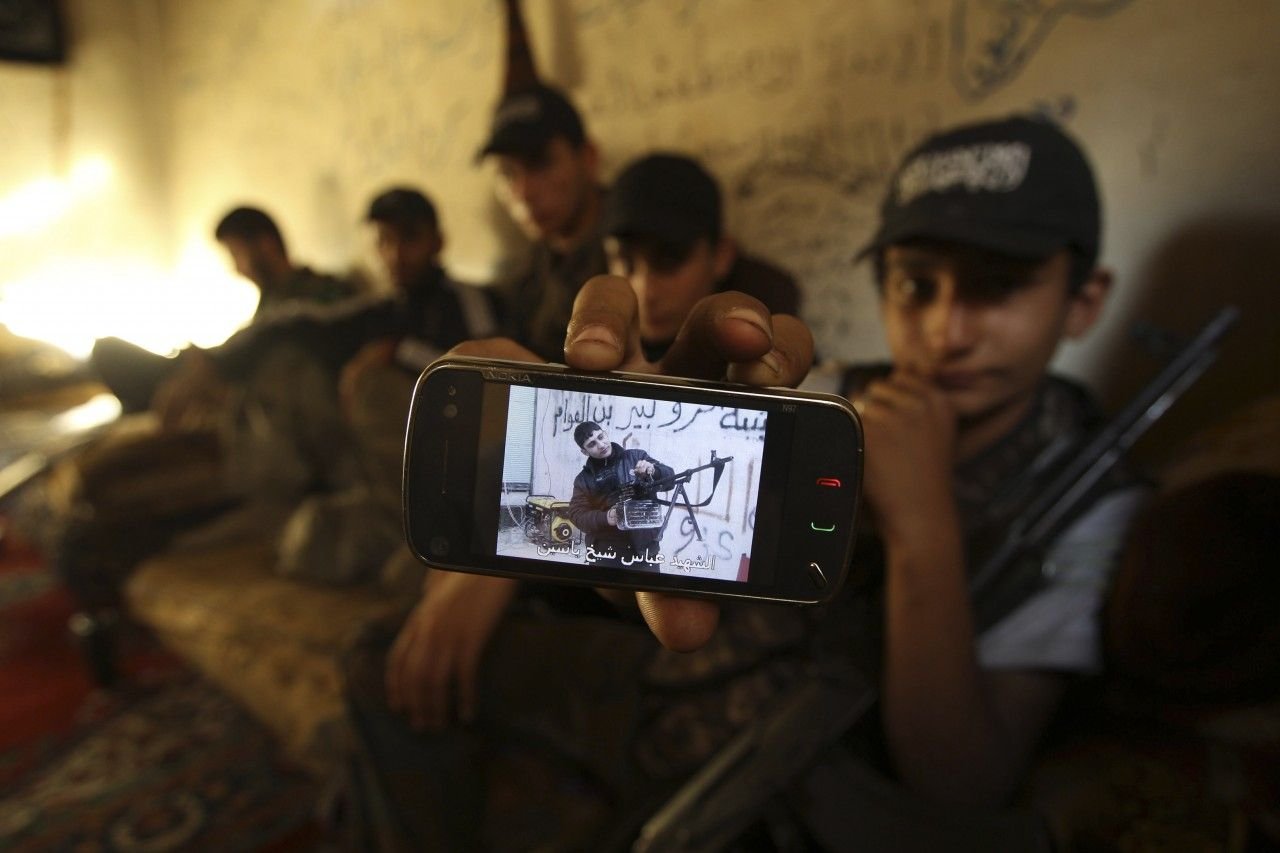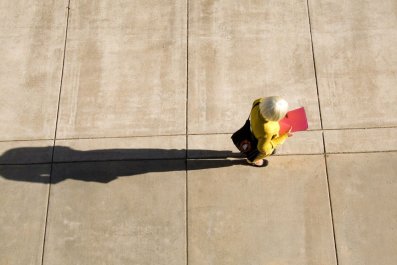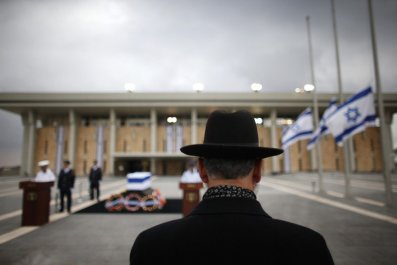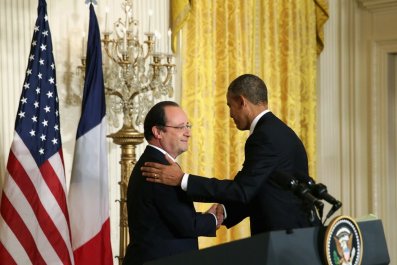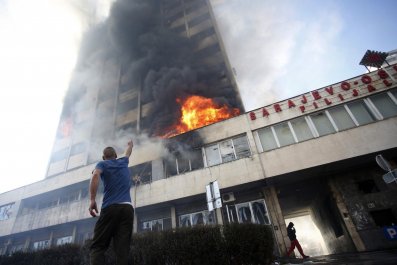"Jihad is the best tourism," a young Dutchman who calls himself Chechclear posted on his Tumblr. He was riding a camel, grinning, his face filtered into an Instagram haze. Chechclear is one of an estimated 1,700 Europeans fighting in Syria. He's part of the Islamic State of Iraq and Syria (ISIS), which Al-Qaeda has just officially disowned, and seems to be having the time of his life. He documents his adventure for adoring fans across several social media platforms.
This is the reality of modern jihad, where the faithful chronicle their response to the cause in real time. But if Europeans like Chechclear are living out their Call of Duty fantasies, they do it at the expense of Syrian lives. In the territory it holds in Syria's North, ISIS is imposing its harsh interpretation of sharia law with torture and beheadings. Its Western fighters are tweeting selfies in the ruins.
In Syria, the battle for territory waged on the ground is matched by a battle for meaning waged on the Internet. Whether they're Kurds carving out an independent state, revolutionaries or TEDx organizers sympathetic to Assad, Syrians use Twitter, YouTube and Facebook to tell their stories. It's contested ground, filled with both propaganda and truth. Posting can be deadly. Both the Assad regime and ISIS target citizen journalists for arrest. In the embattled Libyan city of Tripoli, I interviewed an aid worker who, at the start of the revolution, smuggled memory cards over the border that contained footage of demonstrations. Once he was in Lebanon, he'd upload the footage to Facebook. Assad had blocked access to the Internet once. Activists were terrified he'd do it again.
Each Friday, the town of Kafranbel unfurls handpainted revolutionary banners. Written in English, full of pop culture and black wit, they are made to go viral - visual bombs forcing the Internet, and by extension, the world, to recognize that there are human beings dying inside of Syria. After George Zimmerman was acquitted of killing Trayvon Martin, a Kafranbel banner read "Martin family! The Syrians are the best who know what it's like to lose loved ones to immune criminals." Later another banner portrayed ISIS as a Giger-esque alien. ISIS fighters shot and wounded Raed Fares, the activist behind the banners.
While the state news agency's English language account blithely tweets about soccer matches, other parts of social media make the truth of Assad's war impossible to conceal. Syrian Twitter accounts show an ouroboros of horror - kids dead from bombing, buildings flattened, starving men slaughtering lions in the Damascus zoo. In a viral video from the besieged Yarmouk camp, a Palestinian man, little more than a skeleton, says he cannot remember the last time he ate.
But while Syrians use social media to expose war crimes, Chechclear and his fellow Westerners often use it to show off. VICE.com journalist Aris Roussinos published photos of British jihadis posing with their guns aloft, like Rambo, silhouetted against the setting sun. The personal Facebook pages Roussinos discovered bragged about a "five-star jihad," with swimming pool frolics, chocolate and weapons training in luxury villas.
Western jihadis in Syria get into Twitter spats, pose with AK-47s, and provide on-the-ground opinions to audiences in the hundreds or thousands. Their war is aspirational. They encourage young men, and sometimes young women accompanied by chaperones, to join them.
On Tumblr Ask pages, engineering students ask fighters if they may complete their degree before joining the fight in Syria (the fighter told the student the jihad needed him now), and girls wheedle to marry mujahideen. A British jihadi made macros of a bloody pistol, reading "YODO: You Only Die Once. Why Not Make It a Martyrdom?" Before he was booted off Instagram for posting pictures of corpses, Chechclear pouted for the camera like a fashion blogger, posting selfies of his luxuriant facial hair, with the hashtags #beardlife and #alphamale. Women wearing niqab, i.e., face veils, argued over the appropriateness of complimenting him in the comments.
Like Chechclear, Abu Layth has an eye for photography. His "frontline" Tumblr is lovely, rife with images of war's dusty glamor - tanks, big skies, fighters looking manfully into the horizon. The aesthetic is not dissimilar from army recruitment ads. In Syria or suburban Idaho, war is beautiful - as long as you stand far enough away.
Westerners who come to fight in Syria most frequently join ISIS, which draws its fighters from across the globe, from Pakistan to Chechnya to Tunis. Formed in April 2013, ISIS splintered off from the Al-Qaeda's affiliate organization in Iraq. It does not primarily fight the Assad regime, but rather local Kurds, the Syrian-dominated Islamic Front and the Free Syrian Army. This has led many to speculate that ISIS is tolerated by the regime.
Their methods are similar. In December, Amnesty International released a report on conditions in ISIS jails. Children as young as 8 were beaten with generator belts. Prisoners were tortured with electric shocks, and forced to guess the weights of freshly severed heads. Not satisfied with beheading people, ISIS even tweeted a picture of one of their jihadis chopping down a 150-year-old oak tree they accused villagers of worshipping. A Syrian civil society activist was lashed by a masked man who told him, "We don't recognize anything called revolution. This is a revolution by kafirs [non-believers]. We are here to set up an Islamic state."
In November, I interviewed Syrian refugees living in tents in Lebanon's Beka'a Valley. They told me that ISIS murdered their family members and forced the niqab on little girls. According to them, ISIS fighters would place their hand on cars, homes or even women, and say "Allahu Akbar" three times. With this pseudo-religious justification, their coveted "object" was theirs.
"I frankly despise every non-Syrian who comes to fight in Syria, whether they are on the regime side or on the opposition side. It's our revolution against injustice by the regime. It's not jihad." Abdulkader Hariri, a 25-year-old English literature graduate in Raqqa, told me in an email. Meanwhile, Abu Qa'qaa', an ISIS fighter, tweeted "all women in Raqqa now wear niqab. Progress from Allah!"
"KA," a Syrian student in the United Kingdom, maintains close ties with relatives in Aleppo and Idlib. He is furious that anyone represents ISIS as part of the Syrian revolution. KA told me his uncle had opened an Internet cafe in his house to make some extra money. But members of ISIS took it over, sold his routers in Turkey and forced him from his home so they could use it as a base. According to KA's relatives, Westerners often come to fight in Syria as "an adrenaline-filled holiday."
"The common habit of Western citizens who never experienced real armed combat is to lurk around the Syrian-Turkish border and immediately cross back to Turkey as soon as anything escalates," KA told me over email. "While they're still in Syria, they just walk around the cities with Kalashnikovs to assert their dominance as they enjoy the privileges of being in a country with a huge power vacuum and a population of starving and desperate people."
Despite the views of some Syrians, these Westerners do not see themselves as foreign invaders. They are Muslims, fulfilling their religious obligation to bring Islamic rule to a Muslim country. When they die, the relaxed lips of their corpses will be reimagined on Instagram as the smiles of martyrs seeing paradise.
@Glock19_, fighting in Syria, wrote in his Twitter bio "This Jihad doesnt belong 2 any group... So whats stoppin U?" In December, @Glock19_ complained that locals wouldn't say hello to him and overcharged mujahideen at shops. Worse, some men prefered to stay with their families in refugee camps instead of taking up arms. "Never came here for these ungrateful syrians" he tweeted. "After the jihad finishes here, if I'm still alive I'll go to another country and continue jihad. jihad never stops."
Correction on 09/14/14: This article originally stated that Tripoli was a Lebanese city. It has been changed to reflect that Tripoli is a city in Libya.



